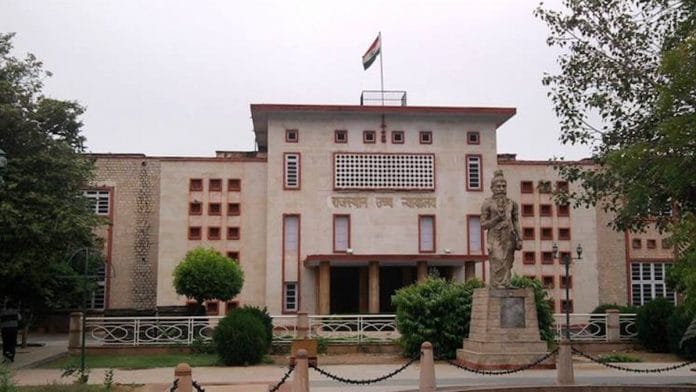New Delhi: The Supreme Court directed the Rajasthan High Court to appoint a woman with low vision as a civil judge in the junior division on Tuesday, paving the way for another appointment of a candidate with a disability in the Rajasthan judiciary.
The case by judicial aspirant Rekha Sharma comes in the aftermath of the appointment of Siddharth Sharma, a visually impaired candidate, to the Rajasthan Judicial Services, last year. In October 2024, the Supreme Court permitted Siddharth Sharma to provisionally appear for an interview after he secured the minimum qualifying marks for candidates with a disability. The move marked a significant step towards creating a more diverse judiciary.
In the current case, acting on a plea by Rekha Sharma, who belonged to the Economically Weaker Section (EWS) category, a bench of Supreme Court Justices B.V. Nagarathna and Satish Chandra Sharma said that either the Rajasthan High Court will appoint her or create a supernumerary seat for her. The judges took the call relying on Article 142 of the Constitution, which allows the top court to do “complete justice” between parties when existing laws or statutes might not provide a suitable solution.
Supernumerary seats are additionally reserved seats, over and above the sanctioned reserved quota. The seats cater to specific policies or needs, such as seats newly created for NRIs or female students, among others.
The question at the heart of the case was whether the Rajasthan High Court fixed the cutoff for candidates within the category of persons with benchmark disabilities (PwBDs), as defined by the Rights of Persons with Disabilities Act, 2016.
Persons with benchmark disabilities have at least 40 percent of a specified disability, not defined in ‘measurable’ terms. The Act also covers persons with less than 40 percent of a specified disability if those disabilities are defined in ‘measurable’ terms and certified by a certifying authority.
The Rights of Persons with Disabilities Act (2016) has recognised 21 types of disabilities.
Rekha Sharma’s lawyers, Rahul Bajaj and Shadan Farasat, along with advocates Talha Abdul Rahman and Taha Bin Tasneem, who assisted them in court, contended that the Rajasthan HC incorrectly fixed the cutoff for the PwBD category. They told ThePrint their grounds were that the court “had not accommodated a candidate, who is both from the disabled and Scheduled Tribe (ST) category, even though she qualified on her merit in the ST category”.
Considering their grounds, the SC exercised its powers under Article 142 of the Constitution to do “complete justice” by directing the Rajasthan HC to appoint the petitioner, Rekha Sharma. The SC bench suggested the HC implement its order by creating a supernumerary seat or accommodating the petitioner in a seat carried forward to a later cycle by giving her, for now, any of the six seats for disabled candidates in that cycle.
Also Read: Rajasthan HC calls for legislation on live-in relationships, directs registration by govt authority
What the case was about
Rekha’s case was that she secured the minimum qualifying marks in the mains of the Civil Judge Exam under the Rajasthan Judicial Service Exams, 2024.
She, however, could not become a civil judge because there was no cutoff set for PwBDs and, what she called, the Rajasthan HC’s fixation with an “arbitrary cutoff”.
In 2024, an HC advertisement for recruitment to the Rajasthan judiciary notified 222 vacancies, with nine reserved for persons with benchmark disability (PwBDs). Two of the nine seats were for persons with blindness or low vision.
The petitioner belonged to both the EWS and PwBD categories.
According to Rule 10(4) of the Rajasthan Judicial Service Examination Rules, 2010, the state shall, from time to time, frame reservation rules for PwBDs.
The Rajasthan Rights of Persons with Disabilities Rules, 2018, in Rule 5, provides the framework for reservation for PwBDs. Rule 5(1) states that four percent of vacancies in each establishment will remain reserved for PwBDs. It states that “the vacancies for persons with benchmark disabilities shall be maintained as a separate class”, underlining the need to maintain a separate cutoff for PwBDs in the examination results at each stage.
How it reached the SC
In her plea, Sharma argued that she wrote the preliminary exam for the civil judge post and qualified for the written part of the mains, according to a cutoff notified for candidates in the EWS category, her vertical category.
However, since there was no separate cutoff for PwBDs, Sharma did not qualify for the exam’s interview component, which was conducted next.
Aggrieved, she approached the top court, and initially, it refused to entertain her plea. However, aiming to qualify for the interview, she subsequently approached the Rajasthan High Court for a separate cutoff for PwBDs.
Meanwhile, in October 2024, the Supreme Court granted relief to some identically placed PwBDs after they secured the minimum qualifying marks but could not get an interview call due to no separate PwBD cutoff.
Following the Supreme Court’s 2024 orders in similar cases, such as Siddharth Sharma’s, the Rajasthan HC permitted Rekha Sharma to take the interview.
After the notification of the final results on October 27, 2024, the cutoff for the mains for the PwBDs was set—121.5 marks— but Sharma contested it, saying that only two PwBDs, in the end, got the civil judge post against nine reserved seats. Other category candidates, she added, filled the remaining seven vacancies.
Hence, challenging the appointments as manifestly arbitrary against the backdrop of her securing the minimum qualifying marks for PwBDs, Rekha Sharma contended, “The fixation of an arbitrary cutoff by the respondents in the PwBD category has resulted in a violation of the right to equality guaranteed to the petitioner under Article 14 of the Constitution. Despite securing the minimum qualifying marks in the PwBD category, the petitioner has failed to be appointed. Hence, she is seeking the indulgence of this Hon’ble Court.”
(Edited by Madhurita Goswami)






